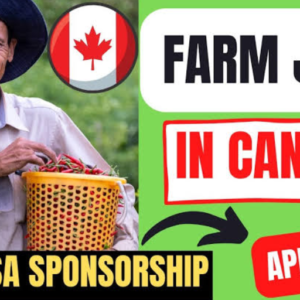Are you interested in a career in the Canadian poultry industry? This dynamic sector offers a variety of rewarding opportunities, and for some positions, the Labour Market Impact Assessment (LMIA) program can bridge the gap between employer needs and your qualifications. This guide dives into the world of LMIA-approved poultry worker jobs in Canada, helping you understand your options and navigate the process.
The Canadian poultry industry offers various employment opportunities, and for some positions, employers can utilize the Labour Market Impact Assessment (LMIA) program to hire foreign workers. Here’s a detailed breakdown of LMIA and poultry-related jobs in Canada:
Understanding LMIA
The LMIA is a process implemented by the Employment and Social Development Canada (ESDC) to assess an employer’s need to hire foreign workers. It ensures that Canadian citizens and permanent residents are given priority for available jobs. Employers must demonstrate their efforts to recruit domestic workers before an LMIA for a foreign worker is approved.
LMIA Approved Jobs for Poultry Workers in Canada
The Canadian poultry industry offers various opportunities, and some positions might qualify for Labour Market Impact Assessment (LMIA) approval, allowing employers to hire foreign workers. Here’s a breakdown of some poultry-related jobs that could be eligible for LMIA, along with their approximate salary ranges:
Processing Jobs:
- Poultry Slaughterers and Cutters: (Salary Range: $14 – $22 per hour) These workers humanely kill and process chickens, turkeys, and other poultry for consumption.
- Poultry Processing Line Workers: (Salary Range: $15 – $20 per hour) They perform various tasks on the processing line, including grading, sorting, trimming, and packaging poultry products.
Farm Jobs:
- Poultry Farm Workers: (Salary Range: $13 – $18 per hour) This category includes workers involved in raising poultry, such as feeding, cleaning barns, collecting eggs, and monitoring bird health.
- Poultry Hatchery Workers: (Salary Range: $16 – $21 per hour) These workers manage the incubation process of eggs and ensure the chicks hatch in healthy conditions.
Support Jobs:
- Poultry Maintenance and Repair Workers: (Salary Range: $18 – $25 per hour) They maintain and repair equipment used in poultry processing plants and farms, ensuring smooth operations.
Important Note:
- Salary ranges are approximate and can vary depending on experience, location, specific job duties, and employer. It’s recommended to use job search engines or resources like Job Bank to find more specific salary information for poultry worker jobs in your desired area.
LMIA approval hinges on several factors, including a genuine need for foreign workers and demonstrating that offered wages and working conditions are comparable to those for Canadian workers in similar positions.
Factors Affecting LMIA Approval for Poultry Workers
The Labour Market Impact Assessment (LMIA) can be a valuable tool for Canadian poultry employers seeking skilled foreign workers. However, securing LMIA approval isn’t guaranteed and hinges on several key factors. Here’s a closer look at the elements that can influence the success of your LMIA application for poultry worker positions:
Demonstrating Genuine Need:
- Recruitment Efforts: The Employment and Social Development Canada (ESDC) wants to see documented proof that you’ve actively tried to recruit qualified Canadians for the position. This might involve advertising on job boards, working with recruitment agencies, or contacting educational institutions with relevant training programs.
- Canadian Labor Pool Exhaustion: You’ll need to convince ESDC that there’s a genuine shortage of qualified Canadians available to fill the job. This could involve showcasing participation in job fairs, offering competitive wages and benefits, or demonstrating a willingness to train less-experienced Canadians.
Wages and Working Conditions:
- Competitive Wages: The wages offered to the foreign worker must be at least equal to the prevailing wage for similar positions in the region. ESDC uses data from Job Bank and other sources to determine prevailing wages.
- Acceptable Working Conditions: The working conditions offered, including hours of work, overtime pay, breaks, and health and safety standards, must meet or exceed Canadian employment standards.
Impact on Canadian Labor Market:
- Protecting Canadian Workers: The LMIA shouldn’t negatively affect the employment opportunities or wages of Canadian poultry workers. ESDC will consider factors like potential displacement of Canadian workers or downward pressure on wages.
Additional Considerations:
- Provincial Variations: LMIA requirements might differ slightly by province. It’s crucial to consult the ESDC website or provincial employment departments for the latest regulations.
- Employer Responsibilities: Employers with LMIA-approved foreign workers have specific responsibilities, including providing proper training, adhering to specific recruitment and accommodation standards, and potentially following up with the foreign worker after their employment concludes.
By carefully considering these factors and ensuring compliance with LMIA regulations, you can increase your chances of securing approval for your poultry worker LMIA application.
Applying for LMIA Approved Jobs for Poultry Workers in Canada
While employers secure LMIA approval, the following steps provide a roadmap for poultry workers interested in LMIA-approved jobs in Canada:
-
Research and Identify LMIA-Eligible Positions:
- Explore job boards and government resources like Job Bank to find poultry worker jobs mentioning LMIA in the description or company information.
- Research common poultry worker roles that might be eligible for LMIA, such as poultry slaughterers, processing line workers, farm workers, hatchery workers, or maintenance personnel (refer to previous sections for details).
-
Target Employers Who Utilize LMIA:
- Look for companies in the poultry industry with a history of hiring foreign workers or actively advertising LMIA-approved positions. Company websites or social media channels might offer clues.
- Consider contacting poultry industry associations or recruitment agencies specializing in placing foreign workers for guidance on finding LMIA-eligible employers.
-
Enhance Your Skills and Qualifications:
- Research the specific skills and experience required for the poultry worker positions you’re interested in.
- Pursue relevant training or certifications, if available, to improve your candidacy and demonstrate your commitment to the field.
- Highlight your transferable skills and experience, even if gained in a different agricultural setting.
-
Connect with Potential Employers:
- Craft a compelling resume and cover letter emphasizing your skills and experience relevant to the poultry industry.
- Apply directly to LMIA-approved job postings. If postings don’t mention LMIA, consider contacting the employer to inquire about their foreign worker recruitment practices.
- Network with individuals in the Canadian poultry industry to learn about job opportunities and gain insights into the application process.
-
Prepare for the Interview (if shortlisted):
- Research the company and the specific poultry worker position thoroughly.
- Be prepared to answer questions about your experience, skills, and motivation to work in the Canadian poultry industry.
- Demonstrate your understanding of LMIA processes and highlight your willingness to comply with any employer-provided training or support.
-
Secure Necessary Documentation (if offered a job):
- Once you receive a job offer, the LMIA process becomes the employer’s responsibility. However, you might need to provide them with specific documents, such as educational certificates, work experience references, or proof of language proficiency.
Additional Tips:
- Consider seeking guidance from immigration professionals or organizations specializing in foreign worker recruitment to navigate legalities and improve your chances of success.
- Stay updated on LMIA regulations and requirements by consulting the ESDC website.
Remember, securing an LMIA-approved job requires collaboration between the employer and the foreign worker. By following these steps and demonstrating your qualifications and commitment, you can position yourself competitively for exciting opportunities in the Canadian poultry industry.
Frequently Asked Questions (FAQs)
Now we shall take a look at some of the frequent questions that people ask about LMIA Approved Jobs for Poultry Workers in Canada:
Q: I’m an employer in the Canadian poultry industry. How can I determine if I need an LMIA to hire foreign workers?
A: LMIA isn’t mandatory for all foreign worker recruitment, but it’s recommended if you can’t find qualified Canadians for the position after making a good faith effort. ESDC offers a self-assessment tool on their website to help you decide. Consider consulting an immigration lawyer for further guidance on the LMIA process specific to your situation.
Q: Are there any specific LMIA exemptions for poultry worker jobs?
A: There aren’t any broad exemptions for the entire poultry industry. However, some exemptions exist for specific occupations or under specific circumstances. ESDC maintains a list of exemptions ([invalid URL removed]) you can explore. It’s always best to confirm with ESDC if your specific situation qualifies for an exemption.
Q: What if my LMIA application for a poultry worker position is rejected?
A: ESDC will provide reasons for rejection in your application decision. You can address those issues and re-apply, or consider appealing the decision if you have strong grounds. Consulting an immigration lawyer can be helpful in navigating the appeals process.
Q: Are there any medical requirements for foreign workers in the Canadian poultry industry?
A: Yes, all foreign workers, including those in poultry jobs, must undergo a medical exam to ensure they don’t pose a public health risk. You can find more information on the required medical exam procedures on the Immigration, Refugees and Citizenship Canada (IRCC) website ([invalid URL removed]).
Q: What are the typical living arrangements for foreign workers in the Canadian poultry industry?
A: Living arrangements can vary depending on the employer and location. Some employers might offer housing or provide assistance with finding accommodation. It’s crucial to discuss living arrangements with the employer during the job offer stage.
Q: I’m a poultry worker with an LMIA-approved job offer in Canada. What should I do to prepare for my arrival?
A: Congratulations! Here are some steps to take:
- Secure your visa: Work with your employer to initiate the visa application process through IRCC.
- Research the area: Learn about the climate, culture, and cost of living in your new location to help you adjust.
- Prepare financially: Set a budget considering housing, transportation, and other expenses.
- Gather necessary documents: Have your passport, work permit, medical exam results, and other required documents readily available.
- Learn some basic French or English: This can help you navigate daily life in Canada.
It’s always recommended to consult with ESDC or an immigration professional for the latest regulations and specific details regarding LMIA for poultry worker jobs in Canada.
See Jobs and Apply
Conclusion
The LMIA program can bridge the gap between Canadian poultry industry needs and skilled foreign workers. By understanding LMIA eligibility, navigating the application process, and following best practices, both employers and foreign workers can increase their chances of success. Remember, LMIA approval hinges on a genuine need for foreign workers, fair wages, and adherence to Canadian labor standards. With careful planning and collaboration, LMIA Approved Jobs for Poultry Workers in Canada can be a valuable pathway for qualified individuals to contribute to the Canadian poultry industry.





